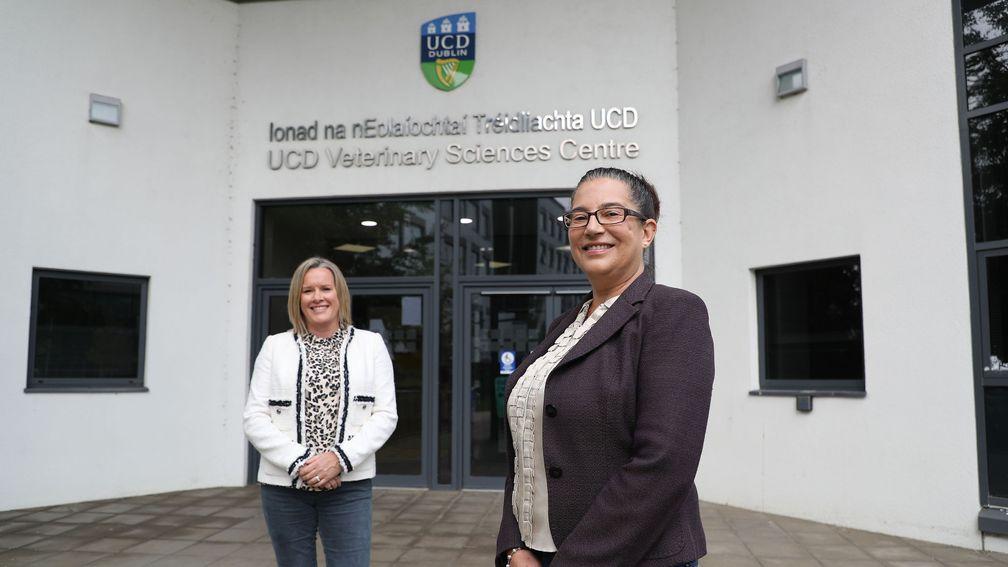Research into the shaping of racehorse DNA given Irish government funding
Study led by University College Dublin professors Emmeline Hill and Lisa Katz

Professors Emmeline Hill and Lisa Katz of University College Dublin have received significant national funding for a five-year research project to investigate the dynamic interplay that exists between the inherited DNA sequence of a horse and the environment.
The €880,000 award was part of a total investment of €53 million in 71 projects under the Science Foundation Ireland (SFI) Frontiers for the Future Programme, announced by Minister for Further and Higher Education, Research, Innovation and Science Simon Harris TD.
Professor Hill, a renowned expert in equine genomics, and Professor Katz from the UCD School of Veterinary Medicine, will use sophisticated genomics and computational technologies to evaluate how the early life environment of the foal, weanling, yearling and young racehorse influences the DNA and affects behaviour, disease and racing performance.
This project will build on a 15-year research programme led by the pair in equine exercise physiology and genomics at UCD which has uncovered many genetic contributions to athletic traits in the horse.
Professor Hill said: "We are delighted to receive this prestigious funding from SFI through the Frontiers for the Future Programme. In our new research programme we will investigate genetic and epigenetic contributions to exercise, disease and behaviour traits in racehorses.”
“Epigenetics refers to the modification of DNA that can alter the activity of genes. A major component of the project is to understand how the early life environment of the foal influences its genetic potential for success.
"This is the first time that epigenetic changes to the DNA of elite athletes, of any species, will be profiled and followed from the early neonatal period to high level performance."
She added: "The DNA that a foal is born with plays a key role in its future potential, but not a defining role. How breeders, trainers, handlers and jockeys shape the DNA of a horse during its early years may have a comparable or perhaps larger contribution to its success. In this project we will use sophisticated genomics technologies to evaluate how the early life environment affects traits that contribute to racecourse success.
"There is likely to be an intricate interplay in behavioural and exercise adaptation between the inherited DNA and the environment that is mediated by epigenetics, which is an additional layer of regulatory information that modulates the activity of genes.
Epigenetic modifications determine how individuals with the same or different genetics will respond to particular environments. Genetics (DNA) is fixed from birth, but epigenetics is dynamic and responsive to external inputs and influences how genes are expressed. This could be particularly relevant to the Thoroughbred where the management of a horse is considered as important as genetics in success on the racetrack.
Professor Katz said: "The benefits of exercise for health and wellbeing are well established, positively influencing clinical presentation of a variety of neurological, musculoskeletal and metabolic diseases. An emerging theme in our genetics research suggests a link between the exercise response and behavioural adaptability in the horse."
Irish equine science company Plusvital and trainer and breeder Jim Bolger will also contribute to this research project.
Professor Katz added: "We are very grateful to be supported once again by Jim Bolger and his team, who have contributed to our research projects for more than 15 years.
"Without the access to horses for our research this work would not be possible. Our collaboration is unique in the global equine research community, and we are delighted this opportunity has been recognised."
The funding award will result in the establishment of four new research positions at UCD.
Read more
Magic Wand to visit Justify in the Hunter Valley as broodmare career begins
Top-class broodmare Joy Valley dies at the age of 31
Lullaby Moon adds to first-season sire Belardo's fine run of form with Group win
Published on 2 November 2020inNews
Last updated 16:25, 2 November 2020
- Well-related winners and placed performers feature at the Tattersalls Cheltenham April Sale
- ‘It’s been constant pressure for the last six months’ - up-and-coming consignors out to make dreams come true at the Doncaster Breeze-Up Sale
- Three new board members for the National Stud
- Hide The Evidence a first winner for Sands Of Mali with victory at Bordeaux Le Bouscat
- Showcasing filly from a deep Moyglare family set for Gowran Park debut on Tuesday
- Well-related winners and placed performers feature at the Tattersalls Cheltenham April Sale
- ‘It’s been constant pressure for the last six months’ - up-and-coming consignors out to make dreams come true at the Doncaster Breeze-Up Sale
- Three new board members for the National Stud
- Hide The Evidence a first winner for Sands Of Mali with victory at Bordeaux Le Bouscat
- Showcasing filly from a deep Moyglare family set for Gowran Park debut on Tuesday